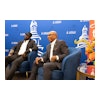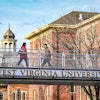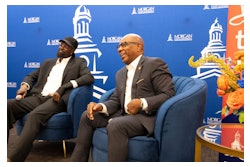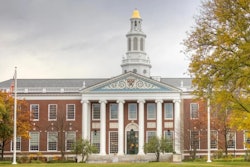When we talk about diversity, equity and inclusion on campus, religion isn’t always a part of the conversation. But with its inaugural international conference, Convergence, a nonprofit focused on campus religious diversity, worked to change that.
Convergence’s International Conference on Religious, Secular, and Spiritual Identities in Higher Education gathered scholars and campus faith leaders online during the first week of August to discuss religion’s place in campus diversity work and what supports students of all faiths – and no faith – need to explore those identities in college.
In three days of live sessions on Zoom, panelists and keynote speakers delved into topics like inequities in campus religious life, new data and literature on student faith experiences, the concept of White Christian privilege and campus anti-Semitism.
The conference also included Ted Talk-style lectures, selected from among a set of proposals, which included research on how faculty can address students’ religious identities in curricula, the role of food in religious communities, the educational and social value of interfaith friendships, models for interfaith engagement and how to involve religious students in diversity, equity and inclusion work.
One of the key themes was higher education’s hesitance to address religion as a formative part of students’ lives.
“I was continually surprised by some of my colleagues’ reluctance and fear to discuss religion and how it intersects with gender, sexuality, race and class in their classrooms,” said Marcella Clinard, a Ph.D. candidate in multicultural women’s & and gender studies at Texas Women’s University. She spoke about her qualitative research on how women’s studies faculty of introductory courses teach or don’t teach about religion as it relates to gender.
“In spite of our field’s stated commitment to analyzing all aspects of the social world intersectionally, I saw a huge disconnect between the needs of our students and our pedagogy,” she said.
But the conference also showcased research showing the positive value of fostering campus religious diversity – and where it could stand to grow.
For example, Dr. Alyssa Rockenbach and Dr. Matthew Mayhew – principal investigators of the Interfaith Diversity Experiences & Attitudes Longitudinal Survey, or IDEALS – shared their new findings on religious campus climate from 3,486 student respondents plus 18 campus case studies. They found that students develop more appreciation for other worldviews, religious and political, particularly in their first year of college. Students also showed modest growth in critical reflection on others’ belief systems in thinking about their own over the course of college.
They found areas where colleges could do more to promote understanding and dialogue, as well. Overall, positive attitudes toward pluralism, interreligious difference, slightly declined over the course of college, though specific groups like Muslims, Evangelical Christians and members of the Church of Jesus Christ of Latter-day Saints made gains. Plus, only 38% of college students reported they had significant disagreements with friends over religion and remained friends, and 59% didn’t have significant disagreements with friends over religion at all.
While a lack of conflict seems like good news, it could mean students are missing out on learning opportunities.
“We wonder if students are not prepared to authentically enter into that kind of dialogue,” Rockenbach said. “Maybe they’re afraid. Maybe they don’t feel that they have the skill set to have that kind of productive conversation.”
One of the big takeaways was that “friendships matter,” she added. “We know that these friendships, especially those that are eliciting more of these kinds of in-depth conversations, are really vital to interfaith learning and development.”
The conference didn’t shy away from some of the thornier tensions in campus religious life, including campus anti-Semitism and debates around Israeli politics in campus communities.
In conversation with Dr. J. Cody Nielsen, Convergence’s founder and executive director, Mark Rotenberg, Hillel International’s vice president of university initiatives and legal affairs, said Jewish students are sometimes held “responsible for Israel and everything it represents,” which can be one cause of discrimination.
“Is a sophomore at Cal State Long Beach supposed to be responsible for defending whatever happens in regard of the Palestinians by the Israeli government … in a particular week or month or year?” he added. “Of course, the answer is no.”
Conference goers discussed the challenge of addressing the issue without suppressing Pro-Palestinian speech. And Rotenberg suggested ways Jewish students and their peers can engage in robust discussion, drawing a distinction between criticism of Israel’s policies and discussions of Jewish faith and identity.
The goal is “enhanced and broader dialogue,” he said.
Honoring religious diversity in higher education is complex, but that’s why it needs attention and study, noted Dr. J.T Snipes and Dr. Sable Manson in a session about their co-edited book “Remixed and Reimagined: Religion, Spirituality, & (Inter)Faith in Higher Education.”
“The complexities of these identities and these experiences are so important. Not only do they need to be acknowledged and validated,” Manson said. “They need to explored, they need to be expressed, they need to be honored, they need to be centered.”
Sara Weissman can be reached at [email protected].



















